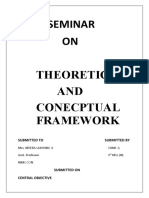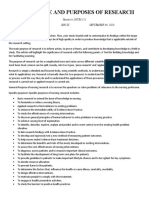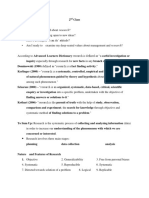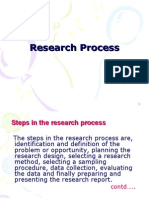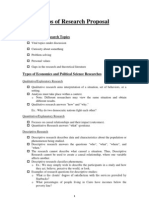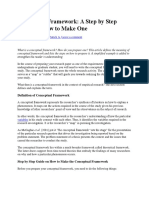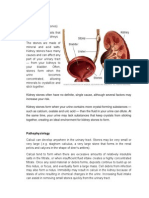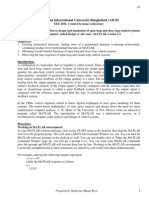Research Problem
Uploaded by
mariaResearch Problem
Uploaded by
mariaConceptualizing study to generate evidence for nursing
RESEARCH PROBLEM
-perplexing or enigmatic situation that a researcher wants to address through
disciplined inquiry
Purpose of Research: to solve the problem -- or to contribute to its
solutionby accumulating relevant information
Sources of research problems:
Experience and Clinical Fieldwork
-Nurses everyday experience is a rich source of ideas
research topics.
for
Nursing Literature
-nursing journals, nonresearch articles, published research
reports
Social Issues
-Topics are suggested by more global contemporary social
or political issues of relevance to the health care community.
-sexual harassment, domestic violence, gender equity
Theory
-To be useful, theories must be tested through research for
their applicability to hospitals, clinics, and other nursing
environment.
Ideas from External sources
-A research topic may be given as a direct suggestion.
-Organizations that sponsor funded research, such as
government agencies, often identify topics on which
research proposals are encouraged.
-Ideas for studies emerge as a result of a brainstorming
session.
Researchers usually identify a broad topic, narrow the scope of the
problem, and then identify questions consistent with a paradigm of choice.
Four important considerations in evaluating research problems:
1. Significance of the problem
Page | 1
Evidence from the study should have the potential of
contributing meaningfully to nursing practice.
In evaluating the significance of an idea, you should pose the
following kinds questions:
*Is the problem an important one?
*Will patients, nurses, or the broader health care community
benefit from the evidence that will be produced?
*Will the results lead to practical applications?
*Will the findings challenge (or lend support to) untested
assumptions?
*Will the study help to formulate or alter nursing practices?
2. Researchability of the Problem
Not all problems are amenable to research inquiry.
3. Feasibility of Addressing the Problem
Time and Timing.
-The scope of the problem should sufficiently restricted that
enough time will be available.
Availability of Study Participants.
- Researchers need to consider whether individuals with
desired characteristics will be available and willing to
cooperate.
Cooperation of Others
- Often, it is insufficient to obtain the cooperation of
prospective study participants alone.
Facilities and Equipment
- It is provident to consider what facilities and equipment will
be needed and whether they will be available before
embarking on a project.
Money
- The investigator on a limited budget should think carefully
projected expenses before making the final selection of a
problem.
Researcher Experience
Page | 2
The problem should be chosen from a field about which
investigators have some prior knowledge or experience.
Ethical Consideration
- A research problem may not be feasible because the
investigation of the problem pose unfair or unethical
demands on participants
4. Researcher Interest
- Genuine interest in and curiosity about the chosen
research problem are critical prerequisites to a successful
study.
Researchers communicate their aims in research reports as problem
statements, statements of purpose, research questions, or hypotheses.
A statement of purpose, which summarizes the overall study goal and
identifies the key concepts (variables) and the study group or population.
Purpose statements often communicate, through the use of verbs and
other key terms, the underlying research tradition of qualitative studies, or
whether the study is experimental or nonexperimental in quantitative ones.
RESEARCH QUESTIONS
-specific query researchers want to answer in addressing the research problem
-In quantitative studies, research questions usually are about the existence,
nature, strength, and direction of relationships.
Direct rewording of statements of purpose, phrased interrogatively rather
than declaratively.
Some research reports thus omit a statement of purpose and state only
research questions.
Research questions in Quantitative Studies
Identify the key variables, the relationships among them, and the
population under study. The variables are all measurable concepts, and
the questions suggest quantification.
Some research questions are about
moderator variables that affect the strength or direction of
a relationship between the independent and dependent
variables; others are about
Page | 3
mediating variables that intervene between the
independent and dependent variable and help to explain
why the relationship exists
RESEARCH HYPOTHESES
-a prediction about the relationship between two or more variables
The Derivation of Hypotheses
Two basic processes:
1. Inductive hypotheses is a generalization inferred from observed
relationships
2. Deductive hypotheses have as starting point theories that are applied
to particular situations.
Types of Hypotheses
o Simple versus Complex Hypotheses
Simple hypotheses express a predicted relationship between one
independent variable and one dependent variable
Complex hypotheses state an anticipated relationship between two or
more independent variables and two or more dependent variables (or
state predictions about mediating or moderator variables)
o Directional versus Nondirectional Hypotheses
Directional hypotheses predict the direction of a relationship;
Nondirectional hypotheses predict the existence of relationships, not
their direction.
o Research versus Null hypotheses
Research hypotheses predict the existence of relationships
Null hypotheses express the absence of a relationship
Hypotheses Testing
*Hypotheses are formally tested through statistical procedures; researchers seek
to determine through statistics whether their hypotheses have a high probability
of being correct. However, hypotheses are never proved through hypothesis
testing; rather, they are accepted or supported.
Page | 4
Finding and Critiquing Evidence: Research Literature Reviews
Research Literature Review
-a written summary of the state of evidence on a research problem
Major steps in preparing a written research review
1. Formulating question
2. Devising a search strategy
3. Conducting a search
4. Retrieving relevant sources
5. Abstracting and encoding information
6. Critiquing studies
7. Analyzing the aggregated information, and
8. Preparing a written synthesis
Written literature reviews vary in purpose and length, ranging from brief
reviews in the introduction of a research report to establish a context for a
new study to lengthier stand-alone reviews that critically appraise the state
of research evidence.
For a research review, study findings are the key ingredients. Information
in nonresearch references including opinion articles, case reports,
anecdotes, and clinical descriptions- may serve to broaden understanding
of a research problem or demonstrate a need for research, but in general
has limited utility in written research reviews.
Types of Information to seek for a Research Review
o Primary source- original description of a study prepared by the
researcher who conducted
o Secondary source- description of the study by a person unconnected
Strategies for finding studies on a topic include the:
o bibliographic tools
o ancestry approach (tracking down earlier studies cited in a reference
list of a report)
o descendancy approach(using a pivotal study to search forward to
subsequent studies that cited it)
o grey literature
An important development for locating references for a research review is the
widespread availability of various bibliographic databases that can be
searched electronically.
Page | 5
o For nurse researchers, the CINAHL (Cumulative Index to Nursing and
Allied Health Literature) and MEDLINE (Medical Literature On-Line)
databases are especially useful and the Web of Knowledge includes
citation indexes that support a descendancy strategy.
In searching a bibliographic database, users can perform a keyword search
that looks for searcher-specified terms in text fields of a database record or
can search according to the subject heading code themselves. Author
searches are also available.
References that have been identified must be screened for relevance and
read, and then pertinent information must be abstracted and encoded for
subsequent analysis. Tools to facilitate the encoding process include formal
review protocols and matrices.
Matrices (two-dimensional arrays) convenient means of abstracting and
organizing information for a literature review
A Methodologic Matrix can be used to record methodologic features of set
of studies; methodologic strengths and weaknesses can also be recorded, or
can be noted in a separate Evaluation Matrix.
Research findings can be recorded in a series of results Matrices- one
corresponding to each independent or dependent variable. The use of such
matrices facilities thematic analysis of the retrieved information.
In preparing written review,
o It is important to organize materials in a logical, coherent fashion.
o The preparation of an outline is recommended.
o The written review should not be a succession of quotes or abstracts.
o The reviewers role is to point out what has been studied, how
adequate and dependable the studies are, what gaps exist in the body
of research, and (in the context of a new study), what contribution the
study would make.
Developing a Theoretical or Conceptual Context
High-quality research requires conceptual integration, one aspect of which is
having a defensible theoretical rationale for undertaking the study in a given
manner or for testing specific hypotheses.
A theory is broad abstract characterization of phenomena. As classically
defined, a theory is an abstract generalization that systematically explains
relationships among phenomena. Descriptive theory thoroughly describes a
phenomenon.
Page | 6
The basic components of a theory are concepts; classically defined theories
consist of asset of propositions about the interrelationships among concepts ,
arranged in a logically interrelated system that permits new statements to be
derived from them.
Concepts are also the basic elements of conceptual models, but concepts
are not linked in a logically ordered, deductive system. Conceptual models,
like theories, provide context for nursing studies.
In research, the overall objectives of theories and models are:
o
o
o
o
to make findings meaningful
to summarize existing knowledge into coherent systems
to stimulate new research
to explain phenomena and relationships among them
Schematic models (or conceptual maps) are graphic representations of
phenomena and their interrelationships using symbols or diagrams and
minimal use of words.
Conceptual framework- the conceptual underpinning of a study, including an
overall rationale and conceptual definitions of key concepts.
The two major conceptual models of nursing used by nurse researchers
are:
o Roys Adaptation Model
o Rogerss Science Unitary Human Beings
Borrowed theories- nonnursing models used by nurse researchers (e.g.
Banduras Social Cognitive Theory); when the appropriateness of borrowed
theories for nursing inquiry is confirmed, the theories become shared
theories.
In some qualitative research traditions (e.g. phenomenology), the
researchers strives to suspend previously held substantive theories of the
phenomena under study; nevertheless, there is a rich theoretical
underpinning associated with the tradition itself.
In both qualitative and quantitative studies, researchers sometimes use a
theory or model as an organizing framework, or as an interpretive tool.
Page | 7
Ethics and Research
Ethical Principles
o Beneficence
-It involves the performance of some good and the protection of
participants from physical and psychological harm and exploitation
(nonmaleficence)
o Respect for Human Dignity
-It involves the participants right to self-determination, which
means participants have the freedom to control their own activities,
including their voluntary participation on the study.
-Full disclosure means that researchers have fully described to
prospective participants their rights and the risks and benefits of the
study. When full disclosure poses the risk of biased results,
researchers sometimes use covert data collection or
concealment (the collection of information without the participants
knowledge or consent) or deception (either withholding information
from participants or providing false information)
o Justice includes the right to fair treatment and the right to
privacy.
Various procedure have been developed to safeguard study
participants rights including:
o the performance of risk/benefit assessment
-In this assessment, the potential benefits of the study to individual
participants and to society are weighed against the costs to
individuals.
o the implementation of informed consent procedures
-It provides prospective participants with information needed to
make a reasoned decision about participation, normally involve
signing a consent form to document voluntary and informed
participation.
-Because of Privacy Rule, a separate authorization form regarding
the use of health data may also be needed.
o taking steps to safeguard participants confidentiality
Page | 8
-Privacy can be maintained through anonymity (wherein not even
researchers know participants identities) or through formal
confidentiality procedures that safeguard the information
participants provide.
Researchers sometimes offer debriefing sessions after data collection
to provide participants with more information or an opportunity to air
complaints.
Vulnerable subjects require additional protection. These people may
be vulnerable because :
o they are not able to make a truly informed decision about study
participation (e.g. children)
o because of diminished autonomy (e.g. prisoners) ;
o because their circumstances heighten the risk for physical or
psychological harm (e.g. pregnant women, the terminally ill)
Researchers need to give extra careful thought to ethical requirements
throughout the studys planning and implementation and to ask
themselves continually whether safeguards for protecting humans are
sufficient.
Ethical conduct in research involves not only protection of the rights of
human and animal subjects, but also efforts to maintain high standards of
integrity and avoid such forms of research misconduct as plagiarism,
fabrication of results, or falsification of data.
Page | 9
You might also like
- Wertsch, J.V. - The Concept of Activity in Soviet Psychology-M.E. Sharpe (1981)100% (2)Wertsch, J.V. - The Concept of Activity in Soviet Psychology-M.E. Sharpe (1981)456 pages
- Ethics in Research: DATE: JULY 21,2018 Presented By: Mr. Florante P. de Leon, Mba, CB100% (4)Ethics in Research: DATE: JULY 21,2018 Presented By: Mr. Florante P. de Leon, Mba, CB32 pages
- How To Critique and Analyze A Quantitative Research Report33% (3)How To Critique and Analyze A Quantitative Research Report12 pages
- 350 Quantitative Research Critique Graded With Rubric Group Ready100% (2)350 Quantitative Research Critique Graded With Rubric Group Ready46 pages
- Comparing and Contrasting Quantitative and Qualitative ResearchNo ratings yetComparing and Contrasting Quantitative and Qualitative Research4 pages
- Difference Between Qualitative and QuantitaveNo ratings yetDifference Between Qualitative and Quantitave13 pages
- Chapter 10: Nature of Research Design and MethodsNo ratings yetChapter 10: Nature of Research Design and Methods10 pages
- IDENTIFYING A RESEARCH PROBLEM Summary'No ratings yetIDENTIFYING A RESEARCH PROBLEM Summary'14 pages
- Quantitative & Qualitative Research Designs100% (2)Quantitative & Qualitative Research Designs31 pages
- Healing The Divide: Navigating Healthcare Inequities in The Philippines100% (1)Healing The Divide: Navigating Healthcare Inequities in The Philippines7 pages
- Comparison Between Qualitative and Quantitative ResearchNo ratings yetComparison Between Qualitative and Quantitative Research11 pages
- Research: Encyclopaedia of Social Sciences, D. Slesinger and M. Stephenson (1930) Defined ResearchNo ratings yetResearch: Encyclopaedia of Social Sciences, D. Slesinger and M. Stephenson (1930) Defined Research15 pages
- Research Design: Meaning and Its ImportanceNo ratings yetResearch Design: Meaning and Its Importance37 pages
- AO No. 2007-0025 PEME For Seafarers Related Documents PDFNo ratings yetAO No. 2007-0025 PEME For Seafarers Related Documents PDF26 pages
- Allergic Rhinitis: Written by Kristeen Moore Medically Reviewed by On October 14, 2015No ratings yetAllergic Rhinitis: Written by Kristeen Moore Medically Reviewed by On October 14, 20153 pages
- Teaching-Learning Process A. Behavioral ObjectiveNo ratings yetTeaching-Learning Process A. Behavioral Objective18 pages
- The Following Tables Describe Degrees of Burn Injury Under This System As Well As Provide Pictorial ExamplesNo ratings yetThe Following Tables Describe Degrees of Burn Injury Under This System As Well As Provide Pictorial Examples2 pages
- SOC-SCI-1-SOCIETY-AND-CULTURE-READING-MATERIALNo ratings yetSOC-SCI-1-SOCIETY-AND-CULTURE-READING-MATERIAL11 pages
- Michael Robert Patterson (2008) Structural Glass Facades 1242159283229100% (1)Michael Robert Patterson (2008) Structural Glass Facades 1242159283229450 pages
- The Effectiveness of Parking Policies To Reduce Parking Dem 2019 TransportNo ratings yetThe Effectiveness of Parking Policies To Reduce Parking Dem 2019 Transport10 pages
- ABDUO - Lateral Occlusion Schemes in Natural and Minimally Restored Permanent Dentition - A Systematic ReviewNo ratings yetABDUO - Lateral Occlusion Schemes in Natural and Minimally Restored Permanent Dentition - A Systematic Review16 pages
- Marketing Research - Fruitzone India Limited50% (2)Marketing Research - Fruitzone India Limited11 pages
- Nina Eliasoph - The Mysterious Shrinking Circle of ConcernNo ratings yetNina Eliasoph - The Mysterious Shrinking Circle of Concern18 pages
- Force in A Statically Indeterminate Cantilever Beam UmmuNo ratings yetForce in A Statically Indeterminate Cantilever Beam Ummu17 pages
- Data Protection - Form of Consent: Your RecordsNo ratings yetData Protection - Form of Consent: Your Records2 pages
- Basic Business Statistics 5th Edition Mark Test Bank - Full Version Is Available For Instant Download100% (1)Basic Business Statistics 5th Edition Mark Test Bank - Full Version Is Available For Instant Download56 pages
- Types of Data Analysis: Techniques and MethodsNo ratings yetTypes of Data Analysis: Techniques and Methods4 pages
- The Oxford Handbook of Environmental Criminology. (2018)No ratings yetThe Oxford Handbook of Environmental Criminology. (2018)898 pages
- Niir Modern Technology Confectionery Industries With Formulae Processes 2nd Revised EditionNo ratings yetNiir Modern Technology Confectionery Industries With Formulae Processes 2nd Revised Edition6 pages
- Wertsch, J.V. - The Concept of Activity in Soviet Psychology-M.E. Sharpe (1981)Wertsch, J.V. - The Concept of Activity in Soviet Psychology-M.E. Sharpe (1981)
- Ethics in Research: DATE: JULY 21,2018 Presented By: Mr. Florante P. de Leon, Mba, CBEthics in Research: DATE: JULY 21,2018 Presented By: Mr. Florante P. de Leon, Mba, CB
- How To Critique and Analyze A Quantitative Research ReportHow To Critique and Analyze A Quantitative Research Report
- 350 Quantitative Research Critique Graded With Rubric Group Ready350 Quantitative Research Critique Graded With Rubric Group Ready
- Comparing and Contrasting Quantitative and Qualitative ResearchComparing and Contrasting Quantitative and Qualitative Research
- Research Methodology and Quantitative MethodsFrom EverandResearch Methodology and Quantitative Methods
- Writing a Research Paper: Quick and Easy GuideFrom EverandWriting a Research Paper: Quick and Easy Guide
- Healing The Divide: Navigating Healthcare Inequities in The PhilippinesHealing The Divide: Navigating Healthcare Inequities in The Philippines
- Comparison Between Qualitative and Quantitative ResearchComparison Between Qualitative and Quantitative Research
- Research: Encyclopaedia of Social Sciences, D. Slesinger and M. Stephenson (1930) Defined ResearchResearch: Encyclopaedia of Social Sciences, D. Slesinger and M. Stephenson (1930) Defined Research
- AO No. 2007-0025 PEME For Seafarers Related Documents PDFAO No. 2007-0025 PEME For Seafarers Related Documents PDF
- Allergic Rhinitis: Written by Kristeen Moore Medically Reviewed by On October 14, 2015Allergic Rhinitis: Written by Kristeen Moore Medically Reviewed by On October 14, 2015
- The Following Tables Describe Degrees of Burn Injury Under This System As Well As Provide Pictorial ExamplesThe Following Tables Describe Degrees of Burn Injury Under This System As Well As Provide Pictorial Examples
- Michael Robert Patterson (2008) Structural Glass Facades 1242159283229Michael Robert Patterson (2008) Structural Glass Facades 1242159283229
- The Effectiveness of Parking Policies To Reduce Parking Dem 2019 TransportThe Effectiveness of Parking Policies To Reduce Parking Dem 2019 Transport
- ABDUO - Lateral Occlusion Schemes in Natural and Minimally Restored Permanent Dentition - A Systematic ReviewABDUO - Lateral Occlusion Schemes in Natural and Minimally Restored Permanent Dentition - A Systematic Review
- Nina Eliasoph - The Mysterious Shrinking Circle of ConcernNina Eliasoph - The Mysterious Shrinking Circle of Concern
- Force in A Statically Indeterminate Cantilever Beam UmmuForce in A Statically Indeterminate Cantilever Beam Ummu
- Basic Business Statistics 5th Edition Mark Test Bank - Full Version Is Available For Instant DownloadBasic Business Statistics 5th Edition Mark Test Bank - Full Version Is Available For Instant Download
- The Oxford Handbook of Environmental Criminology. (2018)The Oxford Handbook of Environmental Criminology. (2018)
- Niir Modern Technology Confectionery Industries With Formulae Processes 2nd Revised EditionNiir Modern Technology Confectionery Industries With Formulae Processes 2nd Revised Edition












